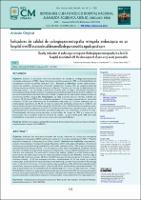| dc.contributor.author | Pérez Acuña-Medina, Katherine Alexandra | |
| dc.contributor.author | Díaz-Vélez, Cristian | |
| dc.date.accessioned | 2022-01-04T16:49:20Z | |
| dc.date.available | 2022-01-04T16:49:20Z | |
| dc.date.issued | 2021-08-17 | |
| dc.identifier.citation | Revista del Cuerpo Médico del HNAAA. 2021; 14(2). | es_PE |
| dc.identifier.uri | https://hdl.handle.net/20.500.12959/2041 | |
| dc.description.abstract | Objetivo: Evaluar la asociación entre los indicadores de calidad de colangiopancreatografía retrógada endoscópica (CPRE) y desarrollo de pancreatitis aguda post-CPRE en el Hospital Regional Lambayeque durante el período 2016–junio 2017. Material y métodos: estudio observacional, transversal analítico, retrospectivo. Población censal 539 y muestra 358. Se evaluaron historias clínicas usando un checklist de indicadores de calidad de “The American Society for Gastrointestinal Endoscopy (ASGE)”. Se usó media y desviación estándar para la edad y frecuencias absolutas y porcentajes para las demás variables. Se evaluó el porcentaje de cumplimiento de cada indicador. Se encontró la asociación entre indicadores de calidad y el desarrollo de pancreatitis usando razones de prevalencia (IC95%) y X2(p<0,05). Resultados: La edad promedio es 52,24+20,168, el 66,5% son mujeres. 98,3% de las CPREs tiene indicación apropiada; 0,3% no tiene consentimiento informado completo; 15,38% tuvo administración de antibiótico adecuada; 92,2% fueron realizadas por un endoscopista capacitado; en 96,9% se logró la canulación profunda, ninguno tuvo medición del tiempo de fluoroscopio, 65,1% logró extracción de cálculos <1cm, 95,5% logró la colocación de stent; ninguna tuvo reporte completo y en el 98,5% los efectos adversos fueron documentados. La tasa de pancreatitis fue 7%, de perforación 0,6% y de hemorragia 2,5%. Solo el 3,9% tuvo control en >14 días. Conclusiones: No existe asociación entre los indicadores de calidad de CPRE y el desarrollo de pancreatitis. No se cumplen todos los criterios de calidad. La pancreatitis post-CPRE tiene más posibilidad de presentarse en mujeres, pero menos en mayores de 65 años. | es_PE |
| dc.description.abstract | Objetive: Evaluate the association between the quality indicators for endoscopic retrograde
cholangiopancreatography (ERCP) and the development of acute pancreatitis post-ERCP in “Hospital
Regional Lambayeque” during the period 2016-June2017. Material and methods: observational,
analytic transversal and retrospective study. Population of 539 and sample 358 patiens. The clinical
histories were evaluated using a checklist of the quality indicators of the “The American Society for
Gastrointestinal Endoscopy (ASGE)”. For the age were used mean and standard deviation; and for
the other variables were used total frequencies and percent. The accomplishment percent of every
indicator was evaluated. The association between the quality indicators and the development of
pancreatitis was made using prevalence reasons (CI95%) and x2(p<0.05). Results: The mean age is
52.24+20.168, 66.5% are women. 98.3% of the ERCPs has appropriate indication; 0.3% doesn´t have
informed consent, 15.38% has adequate antibiotic administration, 92.2% was made by a trained
endoscopist, in the 96.9% the deep canulation was achieved, any has measurement of fluoroscopy
time, in the 65.1% the stones <1cm were extracted successfully, in the 95.5% stent was placement
successfully; any has a complete report; and in the 98.5% the adverse effects were documented. The
rate of pancreatitis was 7%, perforation 0.6% and bleeding 2.5%. Only 3.9% has control in >14 days.
Conclusions: There is no association between the quality indicators for ERCP and the development
of acute pancreatitis post-ERCP. Not all the quality indicators were achieved. Post-ERCP Pancreatitis
has more possibility to develop in woman and less possibility to develop in 65 or more years patients. | |
| dc.format | application/pdf | es_PE |
| dc.language.iso | spa | es_PE |
| dc.publisher | Seguro Social de Salud (EsSalud). Hospital Nacional Almanzor Aguinaga Asenjo | es_PE |
| dc.relation.uri | https://cmhnaaa.org.pe/ojs/index.php/rcmhnaaa/article/view/1028 | |
| dc.rights | info:eu-repo/semantics/openAccess | es_PE |
| dc.rights.uri | https://creativecommons.org/licenses/by/4.0/ | es_PE |
| dc.subject | Colangiopancreatografia retrógrada endoscópica | es_PE |
| dc.subject | Coledocolitiasis | es_PE |
| dc.subject | Perú | es_PE |
| dc.subject | Pancreatitis | es_PE |
| dc.subject | Lambayeque | es_PE |
| dc.subject | Hospitalización | es_PE |
| dc.subject | Cholangiopancreatography | |
| dc.subject | Endoscopic retrograde | |
| dc.subject | Pancreatitis | |
| dc.subject | Choledocholithiasis | |
| dc.subject | Hospitalization | |
| dc.title | Indicadores de calidad de colangiopancreatografía retrógada endoscópica en un hospital nivel III asociados al desarrollo de pancreatitis aguda post-cpre | es_PE |
| dc.title.alternative | Quality indicators of endoscopic retrogated cholangiopancreatography in a level III hospital associated with the development of post-ercp acute pancreatitis | |
| dc.type | info:eu-repo/semantics/article | es_PE |
| dc.subject.ocde | https://purl.org/pe-repo/ocde/ford#3.05.00 | es_PE |
| dc.publisher.country | PE | es_PE |
| dc.identifier.doi | https://doi.org/10.35434/rcmhnaaa.2021.142.1028 | |






